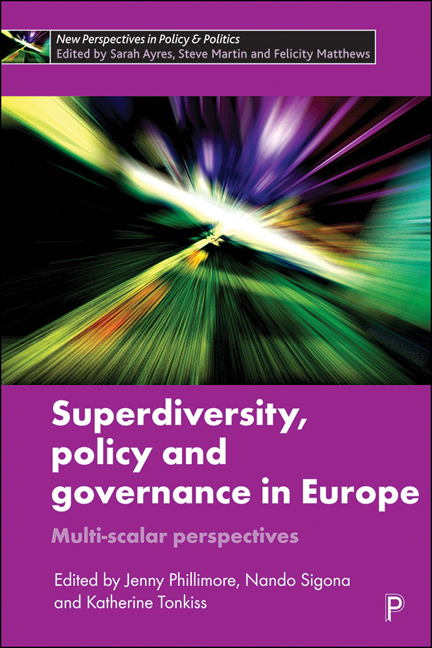Book contents
- Frontmatter
- Contents
- List of Figures and Tables
- Notes on Contributors
- Introduction: Superdiversity, Policy and Governance in Europe
- Chapter One Managing Superdiversity? Examining the Intercultural Policy Turn in Europe
- Chapter Two Mainstreaming in Response to Superdiversity? The Governance of Migration-Related Diversity in France, The UK and the Netherlands
- Chapter Three Making the Most of Superdiversity: Notes on the Potential of a New Approach
- Chapter Four Superdiversity and Sub-National Autonomous Regions: Perspectives from the South Tyrolean Case
- Chapter Five Transmigration: The Rise of Flexible Migration Strategies as Part of Superdiversity
- Chapter Six Superdiversity, Multiculturalism and Local Policies: A Study on European Cities
- Chapter Seven Integrating Superdiversity in Urban Governance: The Case of Inner-city Lisbon
- Chapter Eight Urban Planning and the Challenge of Superdiversity
- Chapter Nine Superdiversity in the Post-Industrial City: A Comparative Analysis of Backlash Narratives in Six European Neighbourhoods
- Index
Chapter Three - Making the Most of Superdiversity: Notes on the Potential of a New Approach
Published online by Cambridge University Press: 04 March 2021
- Frontmatter
- Contents
- List of Figures and Tables
- Notes on Contributors
- Introduction: Superdiversity, Policy and Governance in Europe
- Chapter One Managing Superdiversity? Examining the Intercultural Policy Turn in Europe
- Chapter Two Mainstreaming in Response to Superdiversity? The Governance of Migration-Related Diversity in France, The UK and the Netherlands
- Chapter Three Making the Most of Superdiversity: Notes on the Potential of a New Approach
- Chapter Four Superdiversity and Sub-National Autonomous Regions: Perspectives from the South Tyrolean Case
- Chapter Five Transmigration: The Rise of Flexible Migration Strategies as Part of Superdiversity
- Chapter Six Superdiversity, Multiculturalism and Local Policies: A Study on European Cities
- Chapter Seven Integrating Superdiversity in Urban Governance: The Case of Inner-city Lisbon
- Chapter Eight Urban Planning and the Challenge of Superdiversity
- Chapter Nine Superdiversity in the Post-Industrial City: A Comparative Analysis of Backlash Narratives in Six European Neighbourhoods
- Index
Summary
Introduction
Since the 1990s issues of diversity and of migration management have received unparalleled policy and scholarly attention in relation to a state of affairs of contemporary western societies in which they are increasingly presented as a normal feature of a globalising world (de Jong, 2014; Pécoud, 2009). A 2016 article by Sara de Jong made a convincing case that the two fields (diversity management and migration management) have too often been studied in isolation from each other and that the policy studies literature could benefit by incorporating diversity management into the study of migration (de Jong, 2016).
In light of the variety of ways in which integration and disintegration policies and practices are intertwined in Fortress Europe's approach to its increasingly diverse population (Hinger and Schweitzer, 2020; Spencer and Triandafyllidou, 2020), this chapter aims at advancing the concept of ‘superdiversity’ as a possibly helpful bridge between the two disciplines of migration and diversity management. The term ‘superdiversity’ was first introduced by Steven Vertovec in 2005 (Vertovec, 2005) and articulated in an academic journal in 2007 as a ‘term intended to underline a level and kind of complexity surpassing anything previously experienced in a particular society’ (Vertovec, 2007, p 1024). The contribution of this chapter to the wider debate around the multilevel governance of superdiversity is to problematise the conceptualisation of identity in relation to difference, to explore how superdiversity might be employed in tackling the policy and governance implications of increasingly complex societies, and to assess its potential and limitations for integration/inclusion policies.
This means opening up questions of identity of the mainstream majority population, and not only of the migrant minorities, and adopting an approach that does not essentialise ethnicity but instead looks at a variety of intersecting identities and needs. In order to do so, this chapter will first problematise the relationship between identity and difference as a way to rethink the dimensions and fluidity that superdiversity consists of; it will then provide a brief overview of the background, that is, how we got to the debate on the death (or serious illness, or rebranding) of multiculturalism (Barber, 2015; Connolly, 2010; Kundnani, 2002).
- Type
- Chapter
- Information
- Superdiversity, Policy and Governance in EuropeMulti-scalar Perspectives, pp. 50 - 74Publisher: Bristol University PressPrint publication year: 2020



